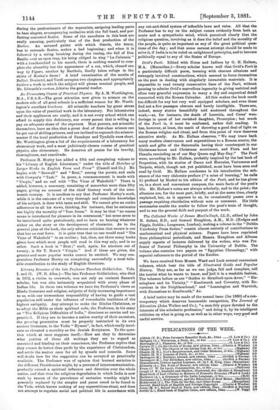Ovid's Pesti. Edited with Notes and Indices by G. H.
Hallam, M.A. (Macmillan.)—Every scholar knows well that Ovid's Fastiia a particularly difficult poem, teeming with obscure allusions and strangely involved constructions, which seemed to force themselves on the poet in dealing with singularly intractable materials. It is impossible to read twenty consecutive lines of the Fasti, without pausing to admire Ovid's marvellous ingenuity in giving metrical and often very graceful expression to many a dry and unpoetieal detail connected with the Roman Calendar. All this makes the book much too difficult for any but very well equipped scholars, and even these find not a few passages obscure and barely intelligible. There are, indeed, many stories beautifully told scattered throughout the work,—as, for instance, the death of Lucretia, and Ceres' wan- derings in quest of her ravished daughter, Proserpine ; bat much of the Pasti is, it must be confessed, rather dull reading. It has, however, at least, the merit of throwing a good deal of light on the Roman religion and ritual, and from this point of view deserves attentive study. As Mr. Hallam observes, "We may trace back many modern observances and superstitions to a Roman source, the mirth and gifts of the Saturnalia having their counterpart in our Christmas-boxes and Christmas merriment, and Flora and her Floralia reminding us of our May Queen 94 May-Day." The Fasti were, according to Mr. Hallam, probably inspired by the last book of Propertius, with its stories of Cams and Hercules, Vertumnus and Tarpeia, which, though not yet published, mast have been seen and read by Ovid. Mr. Hallam condenses in his introduction the sub- stance of the very elaborate preface (" a mine of learning," he calla it) prefixed by Merkel to his edition of the Pesti, and he has givei. us, in a short and convenient compass, the main facts of the poet's life. Mr. Hallam's notes are always scholarly, and to the point ; the allusions are, for the most part, briefly, and at the same time, clearly explained, but, as it appears to us, he occasionally passes over a passage requiring elucidation without note or comment. His little summaries enable the reader to follow the poet's train of thought, and to see the general drift and purport of the work.


































 Previous page
Previous page